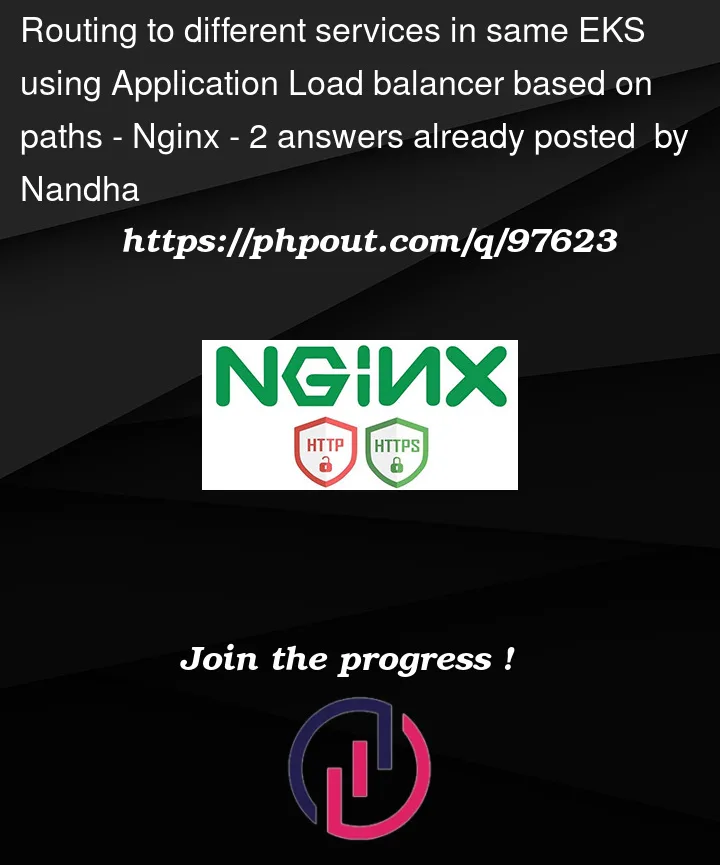Let me give brief about the question. We have deployed our flask services in EKS. Previously we were able to route to different service in the same EKS based on path using classic load balancer in AWS. Since Classic LB is deprecated, we migrated to Application LB. Here we are not able to do path based routing for flask services. How to achieve path based routing in ALB for flask service running in different port in same EKS cluster?
Detailed description is given below.
aws eks --region eu-west-2 update-kubeconfig --name alb-check
kubectl create namespace check
After that we have installed nginx
helm repo add ingress-nginx https://kubernetes.github.io/ingress-nginx
helm repo update
helm install nginx-ingress ingress-nginx/ingress-nginx
--namespace check
--set controller.replicaCount=2
--set controller.nodeSelector."beta.kubernetes.io/os"=linux
--set defaultBackend.nodeSelector."beta.kubernetes.io/os"=linux
After running the above command, a classic ingress controller is created in the region with some DNS name.
Then we have deployed 2 similar services using following yaml.
#####
apiVersion: apps/v1
kind: Deployment
metadata:
name: console
namespace: check
labels:
app: console
spec:
replicas: 1
selector:
matchLabels:
app: console
strategy:
rollingUpdate:
maxSurge: 1
maxUnavailable: 0
type: RollingUpdate
template:
metadata:
labels:
app: console
spec:
containers:
- name: console
imagePullPolicy: Always
image: xxxxxx.dkr.ecr.eu-west-1.amazonaws.com/check:sample_1
---
---
apiVersion: v1
kind: Service
metadata:
name: console
namespace: check
spec:
selector:
app: console
ports:
- protocol: TCP
port: 3000
targetPort: 3000
type: ClusterIP
The content of the docker image also given below.
from flask import Flask
from flask import jsonify
app_name = "Check1"
app = Flask(app_name)
portVal = 3000
@app.route('/', methods=['GET'])
def api0():
data = {"code": 200, "source": "api1", "message": "This service 1", "port": portVal}
return jsonify(data)
@app.route('/api1', methods=['GET'])
def api1():
data = {"code": 200, "source": "api1", "port": portVal}
return jsonify(data)
@app.route('/api2', methods=['GET'])
def api2():
data = {"code": 200, "source": "api2", "port": portVal}
return jsonify(data)
if __name__ == "__main__":
app.run()
Corresponding docker file.
FROM python:3.7
RUN mkdir /check
ADD ./s1/app_file.py /check/app_file.py
ADD ./s1/s1_requirements.txt /check/s1_requirements.txt
WORKDIR /check
RUN pip install -r ./s1_requirements.txt
EXPOSE 3000
CMD ["gunicorn", "-b", "0.0.0.0:3000", "app_file:app", "--workers", "3", "--threads", "25", "--timeout", "660"]
The file s1_requirements.txt had only 2 requirements.
Flask==2.1.2
gunicorn==19.9.0
I have deployed another similar service only difference is it is running on different port 3001. After deploying both services, i have configured ingress using the following file.
apiVersion: networking.k8s.io/v1
kind: Ingress
metadata:
name: check-ingress
namespace: check
annotations:
nginx.ingress.kubernetes.io/rewrite-target: /$1
nginx.ingress.kubernetes.io/use-regex: "true"
kubernetes.io/ingress.class: nginx
nginx.ingress.kubernetes.io/cors-allow-headers: "Content-Type,authToken,sdk-Key,data,api-type,Authorization,userId,teamId"
nginx.ingress.kubernetes.io/cors-allow-methods: "GET, POST, PUT, DELETE, OPTIONS"
nginx.ingress.kubernetes.io/enable-cors: "true"
nginx.ingress.kubernetes.io/cors-allow-credentials: "true"
nginx.ingress.kubernetes.io/proxy-connect-timeout: "600"
nginx.ingress.kubernetes.io/proxy-read-timeout: "600"
nginx.ingress.kubernetes.io/proxy-send-timeout: "600"
nginx.ingress.kubernetes.io/client-body-buffer-size: "16m"
nginx.ingress.kubernetes.io/proxy-body-size: "16m"
nginx.ingress.kubernetes.io/enable-modsecurity: "true"
spec:
rules:
- http:
paths:
- pathType: Prefix
backend:
service:
name: console
port:
number: 3000
path: /console/(.*)
- pathType: Prefix
backend:
service:
name: console2
port:
number: 3001
path: /console2/(.*)
kubectl apply -f ingress.yaml
So far things works as expected.
when i give DNSURL/console/api1 => I am able to get response from service 1’s api1 which is running on port 3000.
Similarly
when i give DNSURL/console2/api1 => I am able to get response from service 2’s api1 which is running on port 3001.
Since classic load balancer is deprecated we thought of using Application load balancer for the above use case.
There we are not able to achieve the routing to services running on different ports based on the paths.
Ran the following commands to create a new EKS cluster and to create ALB.
Reference aws doc
eksctl create cluster --name alb3-check --region eu-west-2 --version 1.22
eksctl utils associate-iam-oidc-provider --region eu-west-2 --cluster alb3-check --approve
aws eks describe-cluster --name alb3-check --query "cluster.identity.oidc.issuer" --region eu-west-2 --output text
aws iam create-policy --policy-name alb3tqAWSLoadBalancerControllerIAMPolicy --policy-document file://iam-policy.json
eksctl create iamserviceaccount
--cluster=alb3-check
--namespace=kube-system
--name=aws-load-balancer-controller
--attach-policy-arn=arn:aws:iam::xxxxxxxxx74:policy/alb3tqAWSLoadBalancerControllerIAMPolicy
--override-existing-serviceaccounts
--approve
kubectl apply --validate=false -f https://github.com/jetstack/cert-manager/releases/download/v1.5.4/cert-manager.yaml
curl -Lo v2_4_1_full.yaml https://github.com/kubernetes-sigs/aws-load-balancer-controller/releases/download/v2.4.1/v2_4_1_full.yaml
sed -i.bak -e 's|your-cluster-name|alb3-check|' ./v2_4_1_full.yaml
kubectl apply -f v2_4_1_full.yaml (Run this twice)
After creating ALB, i have deployed same services in this EKS.
apiVersion: apps/v1
kind: Deployment
metadata:
namespace: check
name: console
spec:
selector:
matchLabels:
app.kubernetes.io/name: console
replicas: 1
template:
metadata:
labels:
app.kubernetes.io/name: console
spec:
containers:
- name: console
imagePullPolicy: Always
image: "xxxxxx.dkr.ecr.eu-west-1.amazonaws.com/check:sample_1"
ports:
- containerPort: 3000
---
apiVersion: v1
kind: Service
metadata:
name: console
namespace: check
spec:
type: NodePort
selector:
app.kubernetes.io/name: console
ports:
- protocol: TCP
port: 3000
targetPort: 3000
Deployed second service which is running on different port 3001.
ingress.yaml content is given below
apiVersion: networking.k8s.io/v1
kind: Ingress
metadata:
namespace: check
name: ingress-check
annotations:
kubernetes.io/ingress.class: alb
alb.ingress.kubernetes.io/load-balancer-name: t3
alb.ingress.kubernetes.io/scheme: internet-facing
alb.ingress.kubernetes.io/target-type: ip
alb.ingress.kubernetes.io/tags: product=check
alb.ingress.kubernetes.io/group.name: test
spec:
rules:
- host: t3-xxxxxx.eu-west-1.elb.amazonaws.com
http:
paths:
- path: /
pathType: Prefix
backend:
service:
name: console
port:
number: 3000
When i give path as ‘/’ in the above yaml, things are working for service 1. I am able to access URL/api or
URL/api2
When i give path as ‘/console’ and apply the yaml,
i am unable to access the APIs (in classic load balancer we were able to do it).
URL/console/api ,
URL/console/api2 are not accessible.
Due to this path, issue we are not able to route to multiple services running on different ports based on paths.




2
Answers
Thanks to @Binh Nguyen's answer, we came to know that URL rewrite is not supported on ALB. So currently we have a workaround and i am posting that here.
Since the path given is not removed during redirect, we have added the same path as url prefix in blue print for the flask services.
Notice that we have introduced blue print for api routes and
url_prefix='/console'for the blue print.In the same way, we have changed the second flask service with url_prefix as
/console2After building and deploying this service, for routing we have given following ingress.yaml.
With the above yaml file, we are able to redirect to corresponding services.
I think what you would like to implement is the URL rewrite capability of AWS ALB Controller. Unfortunately, this feature is not supported by now.
You can check this out at:
There are also mentioned work-arounds that you can apply, such as an additional backend to redirect your application to your preferred path.
or you can consider another approach by using different Host for your application. For example:
console1.app.netconsole2.app.net